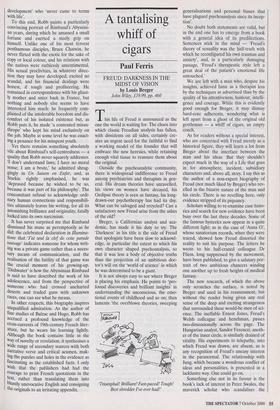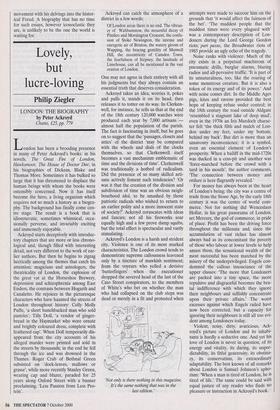A tantalising whiff of cigars
Paul Ferris
FREUD: DARKNESS IN THE MIDST OF VISION by Louis Breger John Wiley, £19.99, pp. 460 This life of Freud is announced as the one the world is waiting for. The chaos into which classic Freudian analysis has fallen, with dissidents on all sides, certainly cre- ates an urgent need for the faithful to find a working model of the founder that will embrace the new heresies, while retaining enough vital tissue to reassure them about the original.
Outside the psychoanalytic community, there is widespread indifference to Freud among psychiatrists and therapists in gen- eral. His dream theories have unravelled, his views on women have decayed, his Oedipus theory is seen as fantasy, his long- drawn-out psychotherapy has had its day. What can be salvaged and recycled? Can a satisfactory new Freud arise from the ashes of the old?
Breger, a Californian analyst and aca- demic, has made it his duty to try. The `Darkness' in his title is the side of Freud that apologists have been slow to acknowl- edge, in particular the extent to which his own character shaped psychoanalysis, so that it was less a body of objective truths than the projection of an ambitious doc- tor's will on the 'world of science' in which he was determined to be a giant.
It is not always easy to see where Breger is placing his emphasis. He points to 'pro- found discoveries and brilliant insights' in understanding the unconscious, the emo- tional events of childhood and so on; then laments 'the overblown theories, sweeping `Triumphal! Brilliant! Fast-paced! Tough! Best shredder I've ever had!' generalisations and personal biases that have plagued psychoanalysis since its incep- tion'.
No doubt both statements are valid, but in the end one has to emerge from a book with a general idea of its predilections. Sentences stick in the mind — 'Freud's theory of sexuality was the half-truth with which he reconfigured his own traumas and anxiety', and, in a particularly damaging passage, 'Freud's therapeutic style left a great deal of the patient's emotional life untouched.'
We are left with a man who, despite his insights, achieved fame as a therapist less by the techniques as advertised than by the quality of his attentiveness, humour, intelli- gence and courage. While this is evidently good enough for Kreger, it may dismay hard-core adherents, wondering what is left apart from a ghost of the original old gentleman — a whiff of cigars, an empty couch.
As for readers without a special interest, who are concerned with Freud merely as a historical figure, they will learn a lot from Breger about the interface between the man and his ideas. But they shouldn't expect much in the way of a Life that goes in for atmosphere, incident, subsidiary characters and, above all, story. I say this as the author of a non-expert biography of Freud (not much liked by Breger) who rev- elled in the bizarre nature of the man and his circle. There is no revelling here, only evidence stripped of its piquancy.
Scholars willing to re-examine case histo- ries and search for new evidence have been busy over the last three decades. Some of the famous hysterics now appear in a quite different light; as in the case of 'Anna 0', whose sanatorium records, when they were traced, showed how Freud distorted the reality to suit his purpose. The letters he wrote to his half-crazed colleague Dr Fliess, long suppressed by the movement, have been published, to give a salutary por- trait of two ambitious chanters winding one another up to fresh heights of medical fantasy.
The new research, of which the above only scratches the surface, is noted by Breger and used in his reassessment, but without the reader being given any real sense of the deep and exciting strangeness that surrounded these would-be men of sci- ence. The ineffable Ernest Jones, Freud's Welsh colleague and henchman, passes two-dimensionally across the page. The Hungarian analyst, Sandor Ferenczi, anoth- er of the inner circle, is similarly drained of vitality. His experiments in telepathy, into which Freud was drawn, are absent, as is any recognition of Freud's uneasy interest in the paranormal. The relationship with Jung, which became a wondrous conflict of ideas and personalities, is presented in a lacklustre way. One could go on.
Something else not in its favour is the book's lack of interest in Peter Swales, the maverick scholar who scandalises the movement with his delvings into the histor- ical Freud. A biography that has no time for such essays, however iconoclastic they are, is unlikely to be the one the world is waiting for.



















































































 Previous page
Previous page